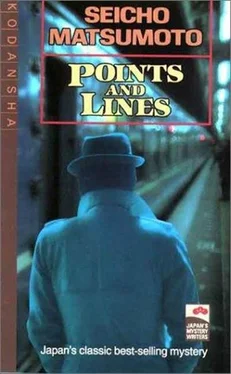Seichō Matsumoto - Points And Lines
Здесь есть возможность читать онлайн «Seichō Matsumoto - Points And Lines» весь текст электронной книги совершенно бесплатно (целиком полную версию без сокращений). В некоторых случаях можно слушать аудио, скачать через торрент в формате fb2 и присутствует краткое содержание. Жанр: Детектив, на английском языке. Описание произведения, (предисловие) а так же отзывы посетителей доступны на портале библиотеки ЛибКат.
- Название:Points And Lines
- Автор:
- Жанр:
- Год:неизвестен
- ISBN:нет данных
- Рейтинг книги:5 / 5. Голосов: 1
-
Избранное:Добавить в избранное
- Отзывы:
-
Ваша оценка:
- 100
- 1
- 2
- 3
- 4
- 5
Points And Lines: краткое содержание, описание и аннотация
Предлагаем к чтению аннотацию, описание, краткое содержание или предисловие (зависит от того, что написал сам автор книги «Points And Lines»). Если вы не нашли необходимую информацию о книге — напишите в комментариях, мы постараемся отыскать её.
Points And Lines — читать онлайн бесплатно полную книгу (весь текст) целиком
Ниже представлен текст книги, разбитый по страницам. Система сохранения места последней прочитанной страницы, позволяет с удобством читать онлайн бесплатно книгу «Points And Lines», без необходимости каждый раз заново искать на чём Вы остановились. Поставьте закладку, и сможете в любой момент перейти на страницу, на которой закончили чтение.
Интервал:
Закладка:
The persons at the station during the four-minute train interval were not there by accident; they had to be there. Their presence was necessary and was arranged by Yasuda. Kawani-shi at Sapporo Station and the waitresses at Tokyo Station were witnesses provided by Yasuda. They were there to prove that he was not at the scene of the double suicide. Both encounters were planned by Yasuda and were tied to the events at Kashii Beach. They had served to show that he had not been present.
But they failed to convince Mihara. He was now more certain than ever that Tatsuo Yasuda had definitely been present. By planting his witnesses, Yasuda had tried to give a false impression. But he had not succeeded; his story had to be an inverted image of the truth. The night of January 20, between the hours of 10 and 11, Tatsuo Yasuda was at Kashii Beach in Kyushu at the scene of the double suicide of Sayama and Otoki. And he was in some way involved. But how, how? That was still unanswered. Yes, he was surely there, on that day and at that hour. He must have watched Kenichi Sayama and Otoki take poison and die. He was not far away from the scene, as he pretended; he was undoubtedly present. After carefully studying Yasuda's actions, it was clear that his statements were lies.
This was Mihara's conclusion. Yet, according to this assumption, Yasuda would have had to leave Hakata for the return journey by the 7:24 Satsuma Express the following morning, the twenty-first. En route, the train stops at Kyoto from 8:30 to 8:44 P.M., the very hour Yasuda was meeting Kawanishi at Sapporo Station in Hokkaido. Kawanishi was not lying; there was no doubt about that. Moreover, Yasuda registered at the Marusō Inn in Sapporo that same night about nine o'clock when the Satsuma would be speeding by the shores of Lake Biwa. How could one explain this contradiction between theory and the bald facts?
And there was yet another serious objection. Evidence that strongly supported Yasuda's statement was his signature on the passenger list of the Sei-kan ferry. This alone was enough to destroy Mihara's assumptions.
But Mihara refused to surrender to the overwhelming evidence. He held something against Yasuda that was strong enough to override these contradictions. It was his instinctive suspicion of Yasuda, his disbelief in the man's story. It was something he could not explain to others.
"Excuse me." The conductor interrupted his train of thought. The streetcar had reached the end of the line; the other passengers had already left. Mihara got off and changed to the Chūō Line which would take him back to the center of town. Yasuda was exceptionally clever, he was thinking. He had planned well, but there had to be a weak point somewhere. Where could it be?
Mihara was sitting in the train by an open window, the wind in his face. He was absorbed in his thoughts, his eyes half closed. Some forty minutes later he looked up suddenly and stared blankly at the advertisements across the aisle. Something had occurred to him. He thought again about seeing the signature of Yoshio Ishida, the X Ministry official, when he had checked the passenger register of the ferry at Hakodate.
"We know a little more now about Yoshio Ishida," said Chief Inspector Kasai. He explained to Mihara that Ishida was very sensitive on account of the scandal within the ministry and he had to act with prudence. The man could not be questioned directly. When he said he knew a little more about him he meant that he had been able to obtain information through other channels.
"We know that Ishida made the trip to Hokkaido on January 20. He left Tokyo from Ueno Station at 7:15 P.M. on the express Towada and arrived at Sapporo on the Marimo at 8:34 P.M. on the twenty-first. These are the same trains that Yasuda took." The chief had a copy of Ishida's schedule. It showed that the division chief had not left the train at Sapporo but had gone on to Kushiro. From there, he had made a tour of the eastern area of Hokkaido for which his office was responsible.
"I had my informant inquire about Tatsuo Yasuda. He confirmed the fact that both men were on the same train as far as Sapporo. Yasuda was also traveling second class but he was in a different coach. I'm told he came by several times to talk to Ishida so was clearly identified. Moreover, Yasuda is well known, for he is often seen at the ministry."
Mihara was bitterly disappointed. Once again, there was someone ready to testify that Yasuda was on the train. And this time it was not a witness provided by Yasuda. Ishida was a high ranking official; his itinerary for the trip to Hokkaido must have been arranged many days before. His name was on the passenger list of the ferry. There was not even a shred of doubt.
Mihara could not hide his disappointment. The chief got up from his desk, "Come on," he said, "the weather is fine. Let's take a walk."
Outside, it was warm and sunny. The bright sunlight was a sign of approaching summer. Men were walking about in their shirtsleeves. Coming out of their dark office in the Metropolitan Police Board building, their eyes were dazzled by the strong light. They crossed the street through heavy traffic and strolled along the palace moat. The white walls of the palace towers reflected the brilliant sunshine. Coming to an empty bench, they sat down. To the passers-by, they looked like a couple of company employees escaping from the office for a brief respite.
"While you were in Hokkaido I had the relations between Sayama and Otoki checked," the chief said. He took out a packet of cigarettes and offered one to Mihara.
Mihara looked at him. He had investigated the two who had committed suicide. For a moment he could not understand the reason. What did the chief have in mind?
"It probably wasn't necessary to check the relations of two people so intimate that they committed double suicide, but I wanted to be absolutely sure," the chief explained as if answering Mihara's unspoken question. "You know, they must have been meeting very secretly because nobody really knows anything about them. The girls at the Koyuki Restaurant were astonished that Otoki had committed suicide with Sayama. Waitresses usually learn about these love affairs very quickly, but in this case they didn't even suspect them. However…" The chief stopped and drew deeply on his cigarette as if to impress Mihara with the importance of what he was about to say.
"However, it's certain that Otoki had a lover. She lived alone in a small apartment where she received many telephone calls. According to the caretaker of the building, it was always a woman's voice on the telephone and she gave the name of Aoyama. Sometimes, when he took the message, he could hear music in the background, so the call might have come from a coffee shop or some similar place. The caretaker believes that she was calling Otoki for someone else, and he's sure that when Otoki came to the phone a man took over. Each time Otoki got a phone call from the woman she would immediately get dressed and go out. This went on for six months, until her death. She never had a man visit her in her apartment. She appears to have been very discreet in her relations with men."
"Do you believe the phone calls were from Sayama?" Mihara asked. He was feeling very uneasy.
"It was probably Sayama. We had Sayama checked also, but that was even less profitable. He had always been a man of few words, I'm told, and in addition, was very shy. Not the type to talk to others about his love affairs. Since we know that he committed suicide with Otoki they must have been lovers."
There was something unconvincing in the way the chief announced his conclusion which increased Mihara's misgivings.
"Then I had Tatsuo Yasuda's private life checked." The chief looked up at the pine trees across the palace moat. A palace guard was standing at the top of the stone wall.
Читать дальшеИнтервал:
Закладка:
Похожие книги на «Points And Lines»
Представляем Вашему вниманию похожие книги на «Points And Lines» списком для выбора. Мы отобрали схожую по названию и смыслу литературу в надежде предоставить читателям больше вариантов отыскать новые, интересные, ещё непрочитанные произведения.
Обсуждение, отзывы о книге «Points And Lines» и просто собственные мнения читателей. Оставьте ваши комментарии, напишите, что Вы думаете о произведении, его смысле или главных героях. Укажите что конкретно понравилось, а что нет, и почему Вы так считаете.












